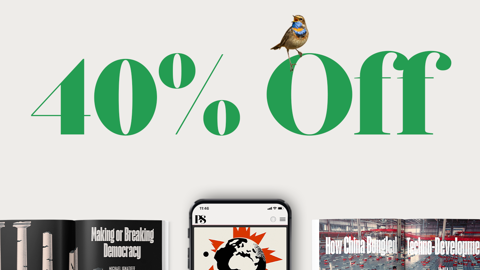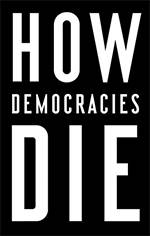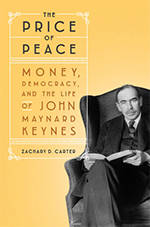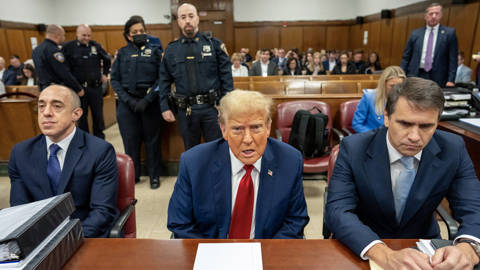Anatole Kaletsky
Says More…
This week in Say More, PS talks with Anatole Kaletsky, Chief Economist and Co-Chairman of Gavekal Dragonomics.
Project Syndicate: In 2017, you wrote, “Donald Trump’s presidency is a symptom of an interregnum between economic orders – a period that will result in a new balance between state and market.” Will Joe Biden’s inauguration tomorrow mark the end of this liminal moment?
Anatole Kaletsky: The short answer is yes. Even before it begins, Biden’s presidency appears to be confirming and entrenching a tectonic shift in the balance between market forces and political forces – or, put another way, between collective decisions made on the basis of “one dollar, one vote” and those based on “one person, one vote.”
This shift began after the 2008 global financial crisis discredited the market-fundamentalist model of capitalism that the United States and Europe had embraced and endorsed since the neoliberal “revolution” in the early 1980s. That ideology had come to dominate the entire world after the Soviet Union’s collapse and the Tiananmen Square massacre in 1989.
The neoliberal model of capitalism is built on the assumption that the market is always right, and the government is usually wrong – precisely the opposite of the dominant assumption of Keynesian “mixed-economy capitalism,” which expects government to try to correct often-problematic market outcomes. The 2008 crisis, however, showed that both markets and governments can be catastrophically wrong – and therefore that politics and business practices both need drastic reform.
What followed was a period of ideological confusion and creative thinking about the balance not only between political and economic decision-making, but also between market prices and social goods. In short, the discrediting of market fundamentalism forced us to embark on a search for the next model of global capitalism.
This process, which I described in my 2010 book Capitalism 4.0: The Birth of a New Economy in the Aftermath of Crisis, was always bound to take a decade or more; that was the case in the 1970s, and in the 1930s. And it opened the way for some highly negative developments, including, in a sense, the rise of Trump, with his reactionary nationalism and economic ignorance.
But the pandemic has imbued this process with a new sense of urgency, by highlighting both the miraculous productiveness of market forces and the indispensable role of strong and competent government in providing public goods, achieving sustainability, regulating market behavior, and redistributing the benefits of economic activity. There is thus a good chance that the debate will now move into a more benign and constructive direction.

SPRING SALE: Save 40% on all new Digital or Digital Plus subscriptions
Subscribe now to gain greater access to Project Syndicate – including every commentary and our entire On Point suite of subscriber-exclusive content – starting at just $49.99.
PS: In the longer term, you recently wrote, “Trump’s constitutional defiance could permanently split the American right between Trump’s army of zealots and Republican politicians who still believe in an orderly transfer of power.” With that, “the monolithic conservative unity that has paralyzed US politics throughout this century may start to crumble.” But that outcome would seem to presuppose sufficient unity on the other side. Can the Democratic Party, with its increasingly influential progressive wing, muster it?
AK: This time, my short answer is no. Indeed, I expect the Democratic Party to splinter as soon as it is in power.
Unity is much harder to achieve with progressives than with conservatives. Conservatives have a single overriding objective: to maintain the power structures and economic privileges of the existing regime. Progressives are united only in their opposition to existing structures, so once in power, they cannot agree on a set of new institutions and policies to replace the ancien régime. Instead, they rapidly splinter into factions. A good example in the US came in 2013, with the botched rollout of Obamacare, President Barack Obama’s signature health-care program.
Despite internal party discord, however, there are three reasons why Biden could be a more effective president than Obama was. For starters, the Republicans are no longer the monolithic obstacle Obama faced; they are now split between traditional conservatives and Trumpist-Tea Party insurgents.
Second, Biden and many of his Cabinet appointees know from bitter experience just how crucial it is to make substantial progress toward economic recovery before the 2022 congressional elections. Obama spent six of his eight years in office as a lame-duck president, because the Republicans re-took the House of Representatives in 2010 (and, in 2014, the Senate). Biden must avoid such an outcome at all costs. This may require him to temper progressives’ expectations on what can be achieved, at least right away.
Third – and somewhat paradoxically – the fact that the Democrats’ Senate majority is razor-thin could make it easier for Biden to keep his party’s warring factions under control.
PS: The European Union and the United Kingdom finally reached a trade deal last month, narrowly averting a “hard Brexit.” In your view, a no-deal Brexit was always less likely than many believed. Will the EU-UK Trade and Cooperation Agreement enable the kind of orderly Brexit you predicted in 2019 – one that produces a “rebound in business confidence” and “a generous budget of tax cuts, public spending giveaways, and Keynesian fiscal stimulus”?
AK: I was completely wrong in predicting an orderly and relatively painless Brexit. I realized this at the very end of 2019, when newly re-elected Prime Minister Boris Johnson began pursuing the sharpest break imaginable. His plan stopped just short of cutting off diplomatic relations and starting a Trump-style trade war.
In the end, that is not quite the break we got. Nonetheless, I expect the UK – which, prior to the Brexit referendum, had boasted the G7’s fastest per capita income growth for 25 years – to spend the next decade as the weakest economy in the group.
Yet Johnson and the Tories may avoid paying a political price for this, because the UK will experience a post-pandemic economic recovery. The fact that other economies are outperforming the UK will not make much impression on voters, especially because the Labour opposition has foolishly decided to follow the Tories in the nationalist direction, focusing entirely on domestic British issues and deliberately ignoring the relationship with Europe and the rest of the world.
PS: Brexit has defied expectations, you observed at the beginning of 2020, by strengthening the EU, rather that triggering a stampede of followers. The EU recovery fund that was agreed last year seemed to confirm this. But to avoid a veto by Hungary and Poland of the recovery fund, dubbed Next Generation EU, German Chancellor Angela Merkel made significant concessions on a provision that conditions release of EU funds on member countries’ adherence to the rule of law. By bowing to the illiberal governments of Hungary and Poland, has the EU merely papered over a major threat to the EU’s unity, or is that threat overblown?
AK: The threat to EU institutions from the “illiberal democracies” of Hungary and Poland is greatly exaggerated, in my view. The Hungarian and Polish governments know full well that their countries’ progress toward economic prosperity – and, thus, their own political survival – depends entirely on EU financial support. As such, I firmly expect the recovery fund and jointly-guaranteed European debt issues to be launched successfully and then expanded, eventually making a major contribution to economic prosperity and financial stability in the EU.
But that does not mean it is smooth sailing ahead. The governments of Hungary and Poland do pose a threat to EU values, especially, the rule of law and civil liberties.
BY THE WAY . . .
PS: Last March, you reportedly “capitulated to bearishness,” owing to your doubts about the pandemic response. By August, however, government action had caused you to undergo a “‘Damascene conversion’ back to bull,” underpinned by the belief that a new “golden age” of Keynesian macroeconomic management may be dawning. But significant risks remain. As 2021 begins, what “known unknowns” are most likely to impede or derail economic recovery?
AK: Now that the US has a unified and competent government, and the EU has agreed on fiscal cooperation and launched its recovery fund, I think the main threats to economic recovery and investment conditions lie in geopolitics and in financial markets themselves.
On the geopolitical front, I expect Biden to abandon Trump’s overtly antagonistic approach toward China, pursuing instead peaceful coexistence, with diplomatic pressure – not tariffs and financial sanctions – as the main lever for influencing the country’s behavior. But if I am wrong, and Biden does uphold Trump’s aggressive approach to countering China’s “malign” influence and behavior – possibly with European and British support – the consequences could be serious. Given its strong recovery from the COVID-19 crisis, China is in a position to respond with economic and financial measures that could cause the US and Europe quite a lot of pain.
The other big risk I see is a bursting of the speculative bubble in US technology stocks, especially those that do not make significant profits and are priced entirely on “hope value” or by the long-term extrapolation of short-term pandemic-related trends. That said, in my view, equity prices in general are not overvalued, and the biggest bubble of all – the unsustainably low and even negative yields on US and European long-term government bonds – will probably remain inflated, pumped up by central banks, for at least another year or two.
PS: One of the key aims of Gavekal Research, which you co-founded in 1999, is to “identify where economic reality and market perception diverge.” During the COVID-19 crisis, worsening economic fundamentals and forecasts have been accompanied by record-high equity prices in the US. What explains this divergence, and will it continue into 2021?
AK: This question demands a very long answer. I will make just one point. The main reason that markets rebounded so quickly, despite the worst slump in economic activity on record, is that governments worldwide injected huge amounts of spending power into their economies. To that end, they ran deficits on a scale that nobody imagined would be politically possible before the pandemic.
With these government deficits and debts backed up by unlimited central-bank financing at zero interest rates, any standard Keynesian economics textbook would say that a strong economic recovery is virtually guaranteed to emerge, once lockdowns and social distancing end. Moreover, if these Keynesian policies seem successful this year, they are likely to be maintained for several more years. As a result, the global economy may be stronger and more stable in the coming decade than it was in the decades preceding the pandemic. This is the benign scenario that financial markets are now pricing – rightly, in my view.
PS: You are a member of the governing board of the Institute for New Economic Thinking, which was created after the 2008 crisis exposed serious shortcomings and flaws of the discipline’s orthodoxy. What intellectual contributions has INET made since then, and how might they inform policymaking in response to the COVID-19 crisis?
AK: INET has supported a lot of brilliant academic work in areas such as Imperfect Knowledge Economics, financial regulation, human development, and environmental economics. Such research has helped to discredit the ideas – such as “perfect” competition, “efficient” markets, and “rational” expectations – that formed the ideological foundations for laissez-faire microeconomics, monetarist central banking, and irrational pre-Keynesian fiscal policy, especially in Europe. As such, it has done as much as INET’s other work – including policy research, academic community-building, and deepening collaboration with the International Monetary Fund, the OECD, and other official institutions – to end market fundamentalism’s intellectual monopoly.
During the COVID-19 crisis, this trend has been particularly apparent. Central banks have accepted their responsibility for managing growth and unemployment, as well as targeting inflation. The IMF and the European Central Bank have warned against fiscal austerity and called on governments to increase borrowing. And politicians all over the world have acknowledged the need for more government intervention to address climate change, tackle inequality, and regulate financial markets.
Kaletsky recommends
We ask all our Say More contributors to tell our readers about a few books that have impressed them recently. Here are Kaletsky's picks:
-

How Democracies Die
by Steven Levitsky and Daniel Ziblatt
This book was published in 2018, but when I read it last summer, it was as if the authors – Harvard Professors specializing in constitutional law and the history of Latin American dictatorships – were describing that moment in American politics. And their account was somehow more accurate, perceptive, and terrifying than any real-time media reports. In fact, Donald Trump’s presidency – together with the recklessly uncritical support he enjoyed from large parts of the US political establishment and business and media interests – has revealed American democracy to be dangerously unstable in many of the same ways as Latin American democracies that have been hijacked by dictators.
The post-Cold War assumption that democracy is so inherently attractive and stable that it is the natural end-point of all political evolution always struck me as ahistorical and illogical. This book shows why – and provides a much-needed antidote to the Trump experience.
-

The Price of Peace: Money, Democracy, and the Life of John Maynard Keynes
by Zachary D. Carter
Unlike Robert Skidelsky’s definitive three-volume intellectual biography of Keynes – and, indeed, the many other excellent Keynes biographies out there – this book is the work of a professional writer, rather than a professional economist. Carter shows as much interest in Keynes’s astonishing literary eloquence, his passion for the arts, and his general enjoyment of life, as in his economic theories and his political activities. As such, he provides a more complex picture of the motivations behind Keynesian economics: to move away from the mean-spirited obsession with the supposedly immutable “iron laws” of impersonal market forces – scarce resources, fiscal austerity, “no free lunches” – and focus on political interventions that enable people fully to enjoy life. That means ensuring that a market economy provides maximum opportunities for growth, employment, and consumption.
The discrediting of neoliberalism in 2008, which the policy response to COVID-19 has confirmed, may mean that the world is again ready for Keynes’s optimistic vision of what economic policy could achieve. This eminently readable book is thus an obvious and important recommendation.
From the PS Archive
From 2017
In “A ‘Macroneconomic’ Revolution?”, Kaletsky notes that a new policymaking doctrine could be replacing the market fundamentalism that failed in 2007. Read more.
In “Why Aren’t US Bond Investors Panicking?”, Kaletsky points out that expectations of slow growth and low inflation remain deeply entrenched. Read more.
Around the web
In “Goldilocks and the 10 Bears of 2021,” Kaletsky assesses a range of factors that could weigh on markets over the next year. Read the article.




